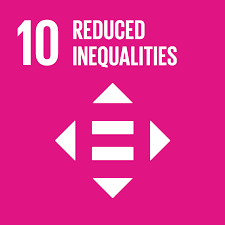When Strength Becomes the Cause Of Weakness
- Oriane

- Jul 21, 2020
- 4 min read
This article is focused on the following Sustainable Development Goals:

For many women, being called strong is a compliment. For many black women across the world, it's a curse. Black women have been praised for the strength that it is said we all possess. But is our strength the reason we shouldn't be taken care of? This one word, one notion has caused thousands of black women to meet a preventative death. It has not done this alone. With the help of systemic racism and prejudice, black women were pushed to the bottom of the priority list. To address this issue, the Sustainable Development Goals have created an umbrella under which direction and structure are provided for projects. The following project to be elaborated on further in this article focusing on educating the very institutions and industries that are biased against the health and general well-being of black women. It works in conjunction with SDG 10 and 16 which focus on Reduced Inequalities and Peace Justice and Strong Institutions, respectively.
Aforementioned, this project focuses on education. Education has a huge role to play with not only breaking down an issue but also finding it's very root. To help do this, I propose a solution: an online course and a provided curriculum. Although we work our whole life to get away from school, life itself is a learning experience. Why not make some of those lessons worth your while? Many medical professionals spend several years earning their degrees and right to practice. When studying medicine, multiple courses are taken. Some necessary, others not so much, but it is important that a medical professional stays well-rounded.
I suggest we implement a course into medical curriculums around the world which focus on the issues of races and gender, and how groups in each category are affected by practices in the field. Nobody likes to be told that they are discriminatory in any shape or form, which is exactly why it's important to introduce such topics in safe spaces. As for those who are already out of school and are practicing, the same teachings and lessons could be adapted into a seminar format. For my research and living in a house with adults, I have often observed that seminars, webinars, and conferences are a common occurrence. Creating such events is sure to attract the attention of not only medics but also the general public.
Of course, we cannot address a problem many do not know even exists. In order to further be faced with the reality of how the negative impact black women face in the medical world, doctors and researchers across the board have gathered data as evidence. In an article written by Endofound.org, titled “The Disparities in Health Care for Black Women”, It was reported that “black women are 3-4 times more likely to die from pregnancy-related complications than white women” (Beim). More so, in an issue brief regarding disparities in black women's healthcare, the National Partnership for Women and Families record that “Black women are more likely to experience preventable maternal death compared with white women.” Black women are not only disproportionately affected in the maternal health aspect, but across the board as well. From these numbers alone, it becomes evident how important a project such as this and the Sustainable Development Goals are to help tackle these issues. The goal of this project is to reduce the inequalities that affect black women and restructure and strengthen the knowledge in the institutions which follow such damaging practices. Having a sustainable way of educating people could help prepare the medical world for the future, and help fix the damage from the past.
SDGs 16 and 10 are a pivotal role in aiding the construction of projects such as these, the same way this project aids the SDGs. They help enforce these goals using education in order to help create a fair and safe environment by those who have not been able to have those for such a long time. We are always taught never to dwell on the past and focus on moving forward, but when the past prevents such movements, we should take a step back. In doing that we are creating a brighter future, with more to move ahead for. Remember, change starts with you.
For More on Curriculums
https://cornerstoneseducation.co.uk/news/how-to-design-your-curriculum/
Works Cited
Beim, Piraye. “The Disparities in Healthcare for Black Women.” Endometriosis : Causes - Symptoms - Diagnosis - and Treatment, 8 June 2020, www.endofound.org/the-disparities-in-healthcare-for-black-women.
“Black Women's Maternal Health.” Black Women's Maternal Health: Apr. 2018, www.nationalpartnership.org/our-work/health/reports/black-womens-maternal-health.html.
Davies, Miquel. “Racism in Health Care – For Black Women Who Become Pregnant, It's a Matter of Life and Death.” NWLC, 13 Apr. 2018, nwlc.org/blog/racism-in-health-care-for-black-women-who-become-pregnant-its-a-matter-of-life-and-death/.
“How Discrimination Can Harm Black Women's Health.” News, 31 Oct. 2018, www.hsph.harvard.edu/news/hsph-in-the-news/discrimination-black-womens-health/.
Nations, United. “About the Sustainable Development Goals – United Nations Sustainable Development.” United Nations, United Nations, www.un.org/sustainabledevelopment/sustainable-development-goals/#:~:text=The%20Sustainable%20Development%20Goals%20are,environmental%20degradation%2C%20peace%20and%20justice.
Nations, United. “Goal 10 | Department of Economic and Social Affairs.” United Nations, United Nations, sdgs.un.org/goals/goal10.
Nations, United. “Goal 16 | Department of Economic and Social Affairs.” United Nations, United Nations, sdgs.un.org/goals/goal16.
Seervai, Shanoor. “How Our Health Care System Treats Black Mothers Differently.” Commonwealth Fund, 18 Oct. 2019, www.commonwealthfund.org/publications/podcast/2019/oct/how-our-health-care-system-treats-black-mothers-differently.






Comments